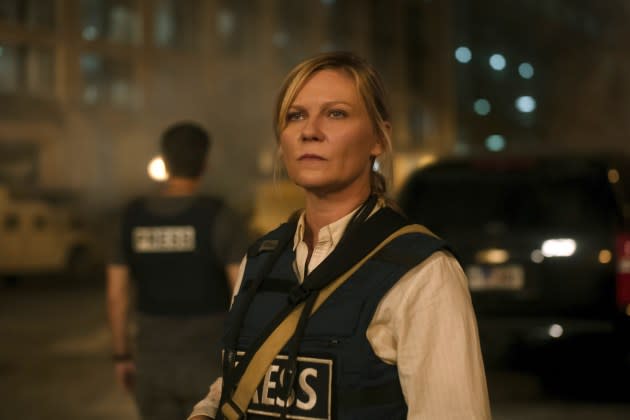‘Civil War’ Director Says ‘I Honestly Don’t Know’ If It’s ‘Responsible or Irresponsible’ to Release the Movie in an Election Year, but Asks: ‘What’s the Consequence of Silence?’
- Oops!Something went wrong.Please try again later.

“Civil War” writer-director Alex Garland gave a lengthy interview to Vulture in which he was asked to weigh in on accusations against his film that claim it’s irresponsible to open it in theaters amid such a turbulent election year. Garland’s film is set in an America at war with itself (Texas and California have seceded to become the Western Forces) and follows a group of journalists attempting to interview the U.S. president.
“The truest thing I’d say about that is I honestly don’t know whether it’s responsible or irresponsible because I would need to know too many things I don’t know in order to be able to answer that question,” Garland answered about “Civil War” opening amid the 2024 election cycle. “But what I do think is that there’s a converse, a counter to that, which is ‘What’s the consequence of not saying things? What’s the consequence of silence? Of silencing oneself or silencing other people?'”
More from Variety
That Garland’s script does not provide much political context at all for the civil war unfolding on screen, which has ignited heated debate among film critics and audiences. The director told Vulture that his film is warning viewers about “two things.”
“If I was going to be reductive in a way, and I’m not inclined to be reductive, I would say that — paradoxically, considering the subject matter — the film is about journalism,” Garland said. “It’s about the importance of journalism. It’s about reporting. The film attempts to function like old-fashioned reporters. That’s thing No. 1.”
The other warning is “a simple acknowledgment that this country, my country, many European countries, countries in the Middle East, Asia, South America, all have populist, polarized politics which are causing and magnifying extreme divisions, and the end state of populism is extremism and then fascism.”
“That relates back again to journalists because you have governments with checks and balances, but you need this other thing, which is the press — free, fair, but also trusted,” Garland added. “And at the moment, the dominant voices in the press are not trusted. They’re trusted to a degree by the choir they’re preaching to but not by the other choirs. I’m in my 50s. When I was a kid, if in what the old days was called a ‘broadsheet newspaper’ ran a story about a corrupt or lying politician, it didn’t matter whether you were a reader of that newspaper or not, the impact would be enormous and very likely would end that person’s career. That world has gone.”
“Civil War” stars Kirsten Dunst as a famous war photographer who is traveling to Washington, D.C. alongside her longtime journalist colleague Joel (Wagner Moura) to get the last interview with the U.S. president before the Western Forces take over. They both work for Reuters. Joining the duo are Sammy (Stephen McKinley Henderson), their war journalist mentor from The New York Times, and Jessie (Cailee Spaeny), an aspiring photographer.
While the film is proving to be one of the most divisive releases in recent months, the conversation surrounding it is at least driving audience interest as it opened to a strong $25 million at the domestic box office. That’s the biggest opening weekend in history for both an A24 movie and for Garland.
Head over to Vulture’s website to read Garland’s interview in its entirety. “Civil War” is now playing in theaters nationwide from A24.
Best of Variety
Sign up for Variety’s Newsletter. For the latest news, follow us on Facebook, Twitter, and Instagram.
